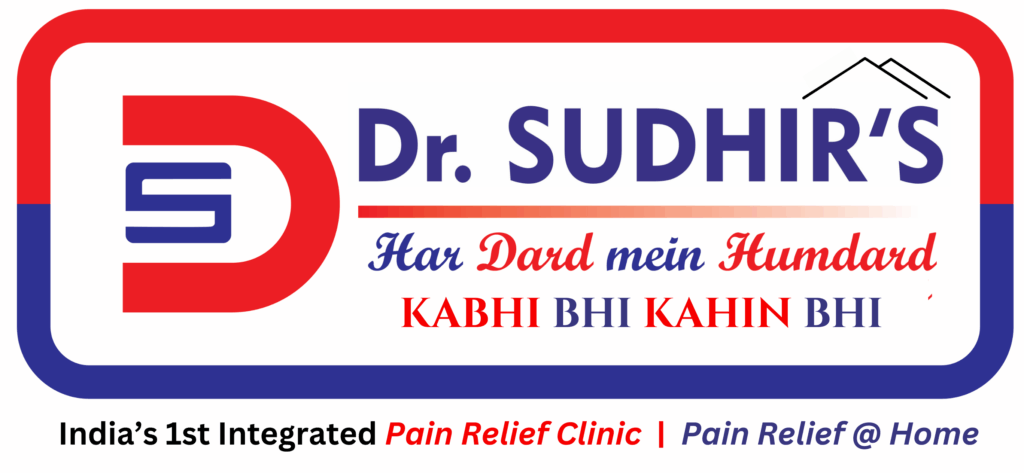Pain is one of the most common reasons people visit a doctor. Whether it’s a backache from long working hours, a headache after stress, or joint pain due to age, most of us start with a general physician. In many cases, this is the right first step. But what if the pain continues despite medicines and rest?
That’s when a pain specialist becomes important. At Dr. Sudhir’s Pain Relief Clinic, we often see patients who have struggled with pain for months before finally finding the right care. This blog will help you understand when it’s time to consult a pain management doctor instead of a general doctor.
The Role of a General Doctor in Pain Management
A general physician or family doctor is usually the first point of contact. They can:
-
Diagnose and treat short-term pain caused by fever, infections, or minor injuries.
-
Prescribe basic painkillers or anti-inflammatory medicines.
-
Recommend initial lifestyle changes like rest, hydration, or over-the-counter remedies.
For common and temporary pain, your family doctor is more than enough. But for persistent pain, their treatment options may be limited.
Who is a Pain Specialist?
A pain specialist (also known as a pain management doctor) is trained in diagnosing and treating chronic, complex, and long-lasting pain. Unlike general doctors, pain specialists focus on identifying the root cause of pain and providing advanced non-surgical solutions.
At Dr. Sudhir’s Pain Relief Clinic, our specialists use a wide range of treatments such as:
-
Targeted injections and nerve blocks
-
Spinal and joint therapies
-
Physiotherapy-guided pain relief
-
Lifestyle and nutrition planning
-
Medication management with minimal side effects
The goal is not just to reduce pain temporarily but to restore mobility, improve sleep, and enhance overall quality of life.
When to See a Pain Specialist Instead of a General Doctor
Here are clear signs that it’s time to move beyond basic care:
1. Pain Lasting More Than 3 Months
If your pain continues beyond the normal healing period, it is considered chronic pain. Examples include:
-
Chronic back pain
-
Ongoing joint stiffness
-
Persistent migraines
-
Nerve pain or burning sensations
A pain specialist can investigate deeper causes and provide treatments that a general doctor may not offer.
2. When Medicines Don’t Work Anymore
Many patients keep taking painkillers prescribed by their physician, but the relief is temporary. Over time, medicines may:
-
Lose their effectiveness
-
Cause side effects like acidity, liver issues, or drowsiness
-
Mask the pain without addressing the underlying cause
A pain management doctor can offer alternative therapies and reduce dependency on long-term medication.
3. Pain is Affecting Daily Life
If pain is stopping you from doing daily tasks — such as working, exercising, or even sleeping — it’s a red flag. Chronic pain often leads to:
-
Fatigue
-
Irritability
-
Reduced work productivity
-
Mental health concerns like anxiety and depression
Pain specialists design personalized treatment plans that not only reduce pain but also improve mental well-being and lifestyle balance.
4. Pain Linked to Specific Conditions
Certain conditions require advanced care, including:
-
Arthritis or osteoarthritis (knee, hip, or shoulder pain)
-
Slipped disc or sciatica
-
Fibromyalgia (widespread body pain)
-
Cancer-related pain
-
Neuropathic pain (nerve pain, burning, or tingling)
For these, general treatment is rarely enough. Pain specialists bring in advanced tools like nerve blocks, joint injections, and minimally invasive therapies.
5. When You Want to Avoid Surgery
Many patients fear surgery for back pain, joint issues, or nerve compression. Pain specialists often provide non-surgical alternatives that can delay or even eliminate the need for surgery.
For example:
-
Epidural injections can relieve slipped disc pain.
-
Radiofrequency ablation can reduce joint pain without cutting.
-
Trigger point injections can ease muscle spasms.
Benefits of Consulting a Pain Specialist
Switching to a pain management doctor brings several advantages:
-
Accurate Diagnosis → Advanced imaging and diagnostic tests help pinpoint the exact cause.
-
Personalized Treatment → No one-size-fits-all; your plan is based on your condition and lifestyle.
-
Holistic Approach → Combines medicines, physiotherapy, diet, and counseling.
-
Better Quality of Life → Relief from pain means improved mobility, energy, and sleep.
-
Prevention of Future Complications → Early treatment avoids worsening of conditions like arthritis or slipped discs.
General Doctor vs. Pain Specialist: Quick Comparison
| Aspect | General Doctor | Pain Specialist |
|---|---|---|
| Suitable For | Short-term pain, minor injuries, fever-related pain | Chronic pain, nerve pain, arthritis, slipped disc, advanced cases |
| Treatment | Basic medicines, rest, initial advice | Advanced injections, non-surgical therapies, personalized care |
| Duration of Relief | Short-term | Long-term & targeted |
| Goal | Temporary symptom relief | Root cause treatment & improved quality of life |
How Dr. Sudhir’s Pain Relief Clinic Can Help
At Dr. Sudhir’s Pain Relief Clinic, we focus exclusively on comprehensive pain management. Our clinic is equipped with:
-
State-of-the-art diagnostic tools
-
Experienced pain specialists
-
Advanced non-surgical treatment options
-
Physiotherapy and lifestyle support
Whether you are dealing with chronic back pain, arthritis, migraines, or nerve pain, we provide personalized treatment plans that work for you.
Final Thoughts
Pain is not something to ignore or live with. If your pain has lasted longer than three months, is not improving with basic medicines, or is affecting your quality of life, it’s time to consult a pain specialist.
At Dr. Sudhir’s Pain Relief Clinic, our mission is simple: to help you live pain-free without unnecessary surgeries. Don’t let pain control your life — let us help you find lasting relief.
Book an appointment today with Dr. Sudhir’s Pain Relief Clinic and take the first step towards a pain-free future.
Call our specialists at +91 91636 95790.







